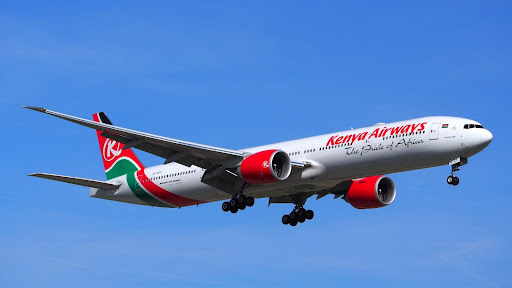- 👨🏿🚀TC Daily
- Posts
- The future of Kenyan banking
The future of Kenyan banking
Today: Will Nigeria publish December's inflation figures?


Good morning☀️️
Welcome back, and happy new year!
We’re back to our usual schedule, bringing TC Daily to your inbox by 7 AM WAT.
Before diving into today’s news, we have a quick favour to ask. At the end of this newsletter, you’ll find a button to let us know if you enjoyed this edition. It’ll be there every day. We’d love to hear your thoughts as often as you can spare them!

Banking
Should the future of Kenyan banking rely on Pesalink?

Kenya has earned global recognition as a trailblazer in mobile money and digital payments, thanks to innovations like M-Pesa, one of the world's most successful mobile money platforms. Since its launch in 2007, M-Pesa has transformed how Kenyans send and receive money, enabling everything from paying school fees in rural areas to settling restaurant bills in Nairobi with just a phone number. Over the years, banks and other financial institutions have built on this foundation, creating solutions like digital loan products and payment apps that make transactions easier for millions of Kenyans.
However, mobile money platforms like M-Pesa and Airtel Money often operate in silos, separate from banks and other financial institutions. For instance, a small business owner in Kisumu who uses M-Pesa might still need to visit their bank to reconcile card payments or transfer funds to their account. Managing payments from multiple systems—card payments, mobile wallets, or bank transfers—is inefficient, especially for businesses with tight margins.
The Central Bank of Kenya (CBK) wants to fix this. On October 18, the CBK announced plans for the Fast Payment System (FPS) to enable instant transfers between all financial institutions, from banks to licensed payment service providers. With FPS, the SME owner in Kisumu can transfer money from their Airtel Money account to a bank account or use their digital wallet to pay for services without worrying about compatibility issues.
Kenyan commercial banks have welcomed the move but believe there’s a quicker path forward.
They’re advocating for an upgrade to Pesalink, a platform they already own through their fintech subsidiary, Integrated Payment Services Limited (IPSL). Pesalink, for example, currently allows people to send money from one bank to another within seconds, even during weekends or public holidays. The banks argued that leveraging Pesalink would be the fastest and most cost-effective way to achieve the CBK’s vision for a unified payment system.
Pesalink currently enables person-to-person (P2P) transfers across its 39 member banks, but it struggles to integrate with mobile money platforms and fintechs. For example, a boda-boda operator in Mombasa who uses M-Pesa might not be able to receive payments from a customer whose bank only supports Pesalink, limiting the operator’s options.
The CBK’s decision will likely shape the future of Kenya’s financial ecosystem. Whether the regulator builds on Pesalink’s existing framework or starts afresh to bring all players under one roof, the outcome could define the next innovation chapter in Kenya’s payments industry. For businesses and individuals alike, the stakes are high: seamless integration could unlock new opportunities, while continued fragmentation risks holding back progress in a country known for leading Africa’s digital transformation.
Capital Markets
Kenya Airways resumes trading shares on Kenya's capital market

In more news from Kenya, the pieces are gradually falling back in place for the once-castaway local airline, Kenya Airways.
The company has made a return to the Nairobi Securities Exchange (NSE) five years after it was suspended from the capital market due to the government’s plan to buy back privately-held shares and renationalise the airline.
The NSE cited the airline’s improved financial performance and the withdrawal of the renationalisation bill—aimed at revitalising the struggling airline—as key reasons for reinstating the shares.
From 2013 to 2022, Kenya Airways was neck-deep in the red, reporting $1.7 billion in losses.
The airline—partly owned by the Kenyan government with 48.9% shares—has relied on the National Treasury to repay its loans and operational costs. However, according to CEO Allan Kilavuka, it didn't receive funding from the government in 2023, likely owing to the latter’s inability to fund public projects—a problem that continued in 2024 with another airline, JKIA.
Kenya Airways has since had to turn to equity investors to get funding to “restructure” its business. For an airline struggling with operating losses, that meant financial discipline. It has aggressively pursued cuts on excessive spending and making debt-to-equity swaps.
Kilavuka has told investors that the company will break even by the end of 2023 and become profitable the following year.
In 2024, Kenya Airways reported its first half-year profit in a decade, earning $3.9 million—a 102% increase year-on-year—as it cut operating losses by more than half.
Since its resurgence, the airline has also seen an increase in registered flights. In 2023, it recorded 5 million passengers, and it carried that momentum into 2024 when it flew 8,000 people in and out of Kenya daily.
Next for Kenya Airways, if Kilavuka’s predictions are to be believed, will be to achieve its first full-year profit for the financial year ending 2024/2025 when it announces the results later this year. The result will cement its comeback status as the airline’s wings begin to spread again.
Economy
Will Nigeria publish December's inflation figures?

Nigeria’s National Bureau of Statistics (NBS) is in the spotlight, but not for its usual economic reports. Three weeks after a cyberattack forced its website offline, the country’s most reliable source of data remains out of reach. As businesses and policymakers prepare for 2025, the uncertainty around access to critical economic information is raising eyebrows—and concerns.
The timing couldn’t be worse. Next week, the NBS is expected to release the December 2024 inflation figures, a key dataset that informs everything from corporate strategy to household budgets. Yet, it’s unclear whether these figures will be published online. The agency confirmed the breach on December 18, days after releasing alarming security data that revealed Nigerians paid ₦2.23 trillion ($1.4 billion) in ransoms between May 2023 and April 2024.
Since the attack, the NBS has failed to release vital statistics, including third-quarter 2024 capital flows and debt figures. For a country grappling with economic uncertainty, the absence of data adds a new layer of complexity. Policymakers rely on this information to guide fiscal and monetary policy, while businesses use it to plan investments and operations. The Central Bank of Nigeria (CBN), for instance, will meet on January 27–28, 2025, to set monetary policy, but without updated inflation data, their decisions may lack critical context.
Beyond inflation, years of essential data—GDP growth rates, unemployment statistics, and trade balances—remain inaccessible. Researchers, investors, and analysts who depend on the NBS website as their primary source of credible information are left in the dark, forced to rely on fragmented or unofficial sources that may not paint an accurate picture.
For businesses, this blackout could stifle decision-making. A manufacturer deciding whether to raise prices or an investor weighing opportunities in Nigeria’s markets needs reliable inflation data to make informed moves. The ongoing silence from the NBS creates ripple effects across sectors, undermining confidence in Nigeria’s economic environment.
As the country awaits the inflation report, one question looms large: how soon can the NBS recover? Until its website is back online, the uncertainty surrounding Nigeria’s economic data will continue to cast a shadow over the year ahead.
CRYPTO TRACKER
The World Wide Web3
Source:

Coin Name | Current Value | Day | Month |
|---|---|---|---|
| $101,704 | + 2.30% | + 1.89% | |
| $3,673 | + 0.05% | - 7.78% | |
$216 | + 0.25% | - 9.37% | |
| $2.41 | - 0.31% | - 6.87% |
* Data as of 06:15 AM WAT, January 7, 2025.
Opportunities
- The SusHi Tech Challenge 2025 is now open for applications from startups that are tackling the global challenge of “realizing Sustainable cities with High Technology (SusHi). With a grand prize of JPY10 million ($65,000), SusHi is offering business support for collaborations with government agencies and other organisations as well as pitching opportunities. Apply by January 15.
- Applications are open for the CcHub-Mastercard Foundation Edtech Fellowship 2025 (Cohort III). This program offers African edtech startups $100,000 in equity-free funding, expert mentorship, and access to an investor network. Eligible startups must focus on education solutions in areas like K-12, tertiary education, or vocational training, with verifiable users. Female founders are encouraged to apply. Don’t miss this chance to scale your edtech solution and transform education in Africa. Apply by January 31, 2025.
- Triggerfish and UNESCO are offering free training and mentorship for African women in animation through the Creator Labs program. Sessions run online from March to May 2025. Apply by February 5, 2025.

Written by: Emmanuel Nwosu & Faith Omoniyi
Edited by: Timi Odueso & Olumuyiwa Olowogboyega
Want more of TechCabal?
Sign up for our insightful newsletters on the business and economy of tech in Africa.
- The Next Wave: futuristic analysis of the business of tech in Africa.
- Entering Tech: tech career insights and opportunities in your inbox every Wednesday at 10 AM WAT.
- TC Scoops: breaking news from TechCabal
P:S If you’re often missing TC Daily in your inbox, check your Promotions folder and move any edition of TC Daily from “Promotions” to your “Main” or “Primary” folder and TC Daily will always come to you.

How was today's edition? |


